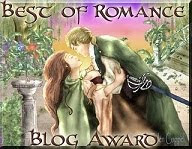I'm excited to have Camryn Rhys, erotic romance author and Golden Claddagh winner blogging about erotic romance and the quest for recognition of this up and coming genre.
A big welcome to Camryn:
When I sat in the Golden Heart/RITA Ceremony at RWA Nationals this year in Orlando, I found myself imagining what it had been like ten years ago, fifteen or twenty years ago, to be nominated for a RITA. Well, it turns out, they didn't even have "RITA"s twenty years ago.
Well, twenty-one years ago, anyway.
In 1989, the top award in Romance Fiction was called "The Gold Medallion", and there were only eight categories (as opposed to today's twelve). The romance genre looked very different in 1989, and I should know, I was reading it, even at my tender age of ---- don't you wish I'd tell you?
You may wonder why, in the midst of such a beautiful and touching ceremony, I was musing about how different the RITAs looked. It's because of a conversation I had with a bunch of Erotic Romance authors at the Passionate Ink party a few days prior. It went something like this:
"Why isn't there a RITA or a Golden Heart for Erotic Romance?"
"I think they voted on that last year, with the epubs stuff."
"Yeah, I heard it's not a real genre."
"I heard that, too. Someone said 'erotic romances are welcome in any category, just like any other heat level of romance.'"
"But erotic romance isn't a heat level."
"You're right. It's a genre."
Being new to the genre, I asked, "What makes it a genre and not a heat level?"
"Think about it. Most 'sensual' romances, you could make non-explicit, and most sweet romances, you could make more explicit, and they'd essentially be the same story. No matter what the heat level. In erotic romance, the explicit language isn't a trapping, it's part of the love story. Their erotic love story *is* the story. If you take it out, there's no more story."
So I sat at the RITA ceremony thinking about the past because I was wondering about the future. I wondered when RWA would choose to validate a quickly growing genre that does herald itself as a genre, and not a heat level.
As an erotic romance author who also writes in other genres, I know when a story idea is an erotic idea and when it's not. It has nothing to do with how much sex is in the book. Putting more sex scenes in doesn't make a book erotic. If you think that, you need to read some erotic romance. I read a fantastic erotic romance novella, once, by Leigh Court, where there is essentially no sex until the last 20 pages (which is almost straight sex, but still... it was a long buildup). And it really was fantastic. Why?
Because the love story of the hero and heroine was an erotic one. Their sexual awakening was part of their love story, and it was integral to the story (to their story) that the book be structured the way it was. Take away all the sex, and their relationship could never have happened. That's not true of non-erotic romances, even the super steamy ones.
Erotic romance novels have plot structures deeply rooted in the physical relationship between an h/h. A man who has dishonored his wife and vows to seduce her back. A woman who faces marriage to a man she hates decides to seduce the man she's loved for ten years in the hopes that she can have one good sexual experience before she's consigned to a loveless marriage. A man who so loves a woman that he offers to have a threesome with her and her husband, just to be in her bed. A woman who would become a werewolf, but needs to release her sexual energy in order to change for the first time. A man who regrounds his magic by having sex with an enchanted woman.
The sex is not just a trapping to books like these. It is integral to the very structure of the book. Without the sex, the plot completely disintegrates. While non-erotic books might not be quite as emotionally engaging without sex, they should still at least make sense without it. Erotic romance needs sex.
Preferrably lots of sex. Multiple ways. Maybe with multiple partners. And we're not averse to a little bondage, kink, or play. That's what erotic romance is all about. The sexual journey.
So I do hope that someday, RWA will acknowledge that erotic romance is not a heat level, it's a genre. And as a genre, it deserves to be honored as such. I also hope that I can be the first recipient of an Erotic Romance RITA. Let's say 2015. Yeah, that can be my goal.
Of course, in order to win a RITA, I need to get published first.
Better get on that. ;-)
Camryn
Visit Camryn at Camryn Rhys ~ Putting the H-O-T in History and at New Kids on the Writer's Block.

















